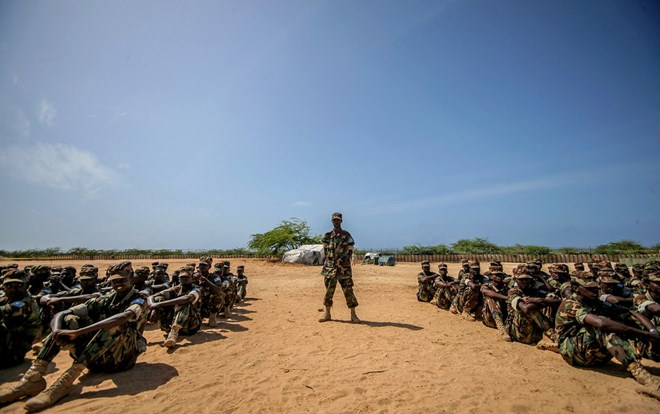by Liban Obsiye & Liban A. Hussein
Thursday, June 24, 2021

A Somalia National Army parade in 2012. Credit: AU-UN IST PHOTO / STUART PRICE.
On 25 April, the Somali National Army (SNA) shocked observers both inside and out the country as it split in two. Amid protests in the capital Mogadishu against the extension of the president’s term, gunfire erupted between hundreds of mutinous uniformed soldiers and those loyal to the government.
After years of investment, the army had started to look better trained, better equipped and more cohesive with its new command structure. Yet seemingly in one fell swoop, it fell apart and divided along clan lines.
The trigger for these tensions was the political dispute around elections. A vote had been due in early-February but it stalled due to disagreements on the process between the federal government and the member states of Puntland and Jubbaland. Still facing a deadlock in mid-April, Somalia’s lower house of parliament voted to extend its own mandate and that of President Mohamed Abdullahi Mohamed (aka Farmaajo) for two years. The MPs argued that this would give the country sufficient time to organise elections with universal suffrage.
This move was met with outrage both in Somalia, whose Senate rejected the move, and among the country’s international donors. There had already been protests and some clashes in Mogadishu in February, but on 25 April the sound of bazookas and machine gun fire could be heard in much of the capital as soldiers allied to the opposition took up strategic positions. They argued the term extension was illegitimate and claimed soldiers allied to the president had been attacking opposition leaders. The violence, which split by clan, led up to an estimated 100,000 people to flee their homes.
After returning to negotiations, the federal government and federal member states came to an agreement on 27 May. They decided that Prime Minister Mohamed Hussein Roble would oversee indirect elections – similar to Somalia’s 2017 process – within 60 days.
Roble quickly established a committee of ministers, MPs and senators who were tasked with de-escalating tensions and sending SNA units sides back to barracks. Soldiers were told to return to their bases within 48 hours. It was agreed that none would face prosecution or loss of wages so long as they agreed to stay out of politics and resume operating under the army’s command and control structures.
A history of fragility
For now, the cracks in the SNA have been papered over again. But the April clashes highlighted the army’s ongoing fragility. This has been a feature of the national security forces since Somalia’s disastrous war with Ethiopia in 1977. After his defeat, the SNA suffered from an erosion of professionalism, morale, and cohesion as it recruited large numbers of soldiers by clan.
When civil war broke out in 1991, the SNA effective ceased to exist at all. In 2000 and then 2006, the governments of the day tried to re-establish the army but failed, leaving clan militias with a monopoly on violence. Another attempt during President Sheikh Sharif’s term of 2009-2012 partially succeeded. However, it was only really under the internationally-recognised administration of President Hassan Sheikh Mohamud in 2012 that the SNA’s rebuilding began on a major scale.
This initiative received serious support from external donors keen to combat Islamist militants. To effectively contain al-Shabaab, they insisted that Somalia needed better trained, equipped, financed, and integrated force. In short, the SNA had to become a real national army. Given Somalia’s long history of clan rivalries, troop integration became a key priority.
A challenging integration
Nearly a decade – and huge investments – later, the SNA has made progress. Yet it still lacks a unified and coherent operational philosophy that transcends clan loyalty. Most soldiers are former clan militias who have been given national uniforms but continue to operate within clan structures and territories. The army’s leadership is dominated by members of Somalia’s major clans.
The dangers of this set up became all too clear in April. Yet the SNA has also shown that integration is possible. At least two special army units, Danab and Gorgor, are well-integrated and effective. Trained by the US and Turkey respectively, they both operate based on merit and draw members from all of Somalia’s clans. They adhere to a common operational philosophy and are well equipped, trained and financed. The two units can provide a template for SNA’s wider integration. Operation Badbaado (“Salvation”), which the SNA launched alongside the African Union force AMISOM and international partners in 2019-2020, also showed that coordination is possible with a cohesive Somali army acting as the lead implementer. Some more technical changes also provide hope. For instance, a biometric registration process has meant that some soldiers are now being paid directly into their bank accounts, circumventing clan structures.
There is no lack of political will or lack of consensus on the importance of integration. At the start of his tenure, President Farmaajo personally lived in the Ministry of Defence for a week to oversee reforms including troop integration strategies. But ultimately, Somalia’s national army will never be able to truly succeed until wider societal mistrust is addressed. Many clan rivalries have yet to been meaningfully reconciled. Elite politics continues to be played out along clan lines. And the country’s federal system lacks clear guidelines on the division of national security responsibilities between the federal government and federal member states.
The SNA can proactively make steps to be more effective and integrated. But to a large extent, a national army can only reflect its national politics. As Somalia awaits its delayed and contentious elections, these politics are notably divided, unstable and uncertain.
Liban Obsiye & Liban A. Hussein
Liban Obsiye is a former Senior Adviser at the Somali Ministry of Foreign Affairs and Investment Promotion and speech writer for the President of the Federal Republic of Somalia, H.E. Mohamed Abdullahi Mohamed. Liban A. Hussein is a security sector expert working in Somalia.